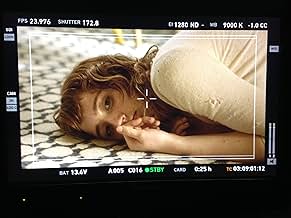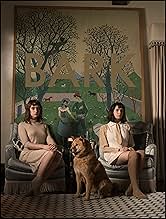Ajouter une intrigue dans votre langueBARK is a portrait of a seemingly simple argument between two teenage girls that curdles into a surreal, psychological struggle.BARK is a portrait of a seemingly simple argument between two teenage girls that curdles into a surreal, psychological struggle.BARK is a portrait of a seemingly simple argument between two teenage girls that curdles into a surreal, psychological struggle.
- Réalisation
- Scénario
- Casting principal
Photos
Histoire
Le saviez-vous
Commentaire à la une
Storytelling is an art, and art is open to interpretation. The less defined the narrative - its characters, setting, events - the more openly it can be interpreted, with or without considering its creator's intent. 'Bark' is pretty wide open.
This is less a short film than it is a short play caught on film. The home in which it is set is pristine, barely looking like a space in which a real person actively lives. That sense of detachment is furthered by the apparent natural light that gives the sitting room a gentle, ethereal, hazy glow. Lines are delivered in a deliberate and even staggered manner - notably less fluid and dynamic than we tend to see in movies where audio engineers can fiddle with possibly overlapping sources of dialogue, or in real life where we'd expect a similar scene to readily feel more emotionally charged and lively.
Art is open to interpretation, and subject as well to the ability of any given individual to make an interpretation. At a couple points during these 11 minutes I had varying notions of what was being conveyed. The argument between Lo (Gina Piersanti) and Dot (Lucia Ribisi) initially strikes us as being pointedly realist: Neither is being fully open and honest about what's bothering them, so nothing will be resolved. Lo is distinctly more forceful while Dot is more demure, once more amusingly (or achingly) echoing real dialogues in which one party will almost always try to rise above the other.
Just as it seems the conversation is about to become more candid, the film takes a turn for the surreal as both characters refer to something that the camera specifically shows us isn't actually there. Shots of Dot seem to increasingly focus on her mildly tattered top, and her choker; her subtle movements as Lo briefly steps out of the room appear weirdly abnormal as the camera zooms in, almost animalistic, as to then suggest a very different angle for this short. This then also leads into Dot suddenly bursting with emotion that hints at a less plain relationship with Lo - and an outpouring of brutal honesty, before the final few minutes become weirdly unsettling and bizarre.
I'm not going to describe every last detail, or wax poetic about my interpretation, because I think to do so would certainly take away from the experience of anyone who watches 'Bark.' I got more out of it with a second view than I did with the first, and likewise with a third, and I think spending more time will peel back more bit by bit. This isn't a short that's readily digestible, in any sense, but nor is it intended to be.
I don't know that I can rightly make any judgment as to quality, good or bad. To consider a short like 'Bark,' so calculated in its artfulness as to be purposefully obtuse, isn't so much a question of what the viewer sees, but what we get out of it. I don't dislike it, but I'm also not entirely sure of what I'm getting here. In the very least, I'd be very curious to watch more films with Piersanti or Ribisi, or by director Amanda Kramer, to see what I can glean of 'Bark' from their other works. And that interest maybe says as much as anything could.
This is less a short film than it is a short play caught on film. The home in which it is set is pristine, barely looking like a space in which a real person actively lives. That sense of detachment is furthered by the apparent natural light that gives the sitting room a gentle, ethereal, hazy glow. Lines are delivered in a deliberate and even staggered manner - notably less fluid and dynamic than we tend to see in movies where audio engineers can fiddle with possibly overlapping sources of dialogue, or in real life where we'd expect a similar scene to readily feel more emotionally charged and lively.
Art is open to interpretation, and subject as well to the ability of any given individual to make an interpretation. At a couple points during these 11 minutes I had varying notions of what was being conveyed. The argument between Lo (Gina Piersanti) and Dot (Lucia Ribisi) initially strikes us as being pointedly realist: Neither is being fully open and honest about what's bothering them, so nothing will be resolved. Lo is distinctly more forceful while Dot is more demure, once more amusingly (or achingly) echoing real dialogues in which one party will almost always try to rise above the other.
Just as it seems the conversation is about to become more candid, the film takes a turn for the surreal as both characters refer to something that the camera specifically shows us isn't actually there. Shots of Dot seem to increasingly focus on her mildly tattered top, and her choker; her subtle movements as Lo briefly steps out of the room appear weirdly abnormal as the camera zooms in, almost animalistic, as to then suggest a very different angle for this short. This then also leads into Dot suddenly bursting with emotion that hints at a less plain relationship with Lo - and an outpouring of brutal honesty, before the final few minutes become weirdly unsettling and bizarre.
I'm not going to describe every last detail, or wax poetic about my interpretation, because I think to do so would certainly take away from the experience of anyone who watches 'Bark.' I got more out of it with a second view than I did with the first, and likewise with a third, and I think spending more time will peel back more bit by bit. This isn't a short that's readily digestible, in any sense, but nor is it intended to be.
I don't know that I can rightly make any judgment as to quality, good or bad. To consider a short like 'Bark,' so calculated in its artfulness as to be purposefully obtuse, isn't so much a question of what the viewer sees, but what we get out of it. I don't dislike it, but I'm also not entirely sure of what I'm getting here. In the very least, I'd be very curious to watch more films with Piersanti or Ribisi, or by director Amanda Kramer, to see what I can glean of 'Bark' from their other works. And that interest maybe says as much as anything could.
- I_Ailurophile
- 23 mars 2021
- Permalien
Meilleurs choix
Connectez-vous pour évaluer et suivre la liste de favoris afin de recevoir des recommandations personnalisées
Détails
- Durée11 minutes
- Couleur
Contribuer à cette page
Suggérer une modification ou ajouter du contenu manquant












